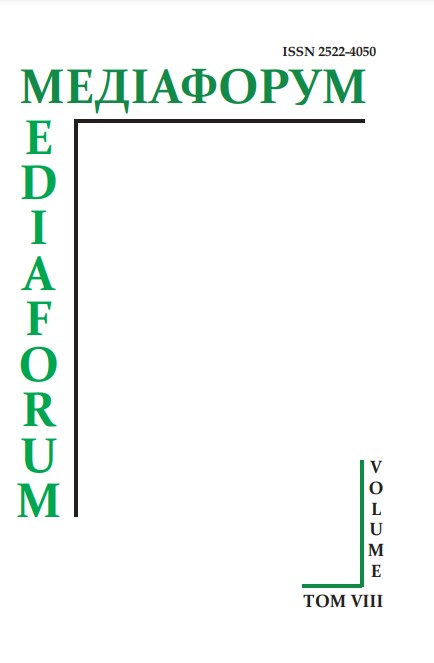Політичні трансформації у Чеській Республіці після «оксамитової революції»: ретроспективний підхід
DOI:
https://doi.org/10.31861/mediaforum.2020.8.148-164Ключові слова:
Чехословаччина, Чеська Республіка, Словацька Республіка, політичні трансформації, «оксамитова революція», Європейський СоюзАнотація
Використавши ретроспективний підхід, авторка дослідила зміни, які відбулися в Чехословаччині після «оксамитової революції» 1989 р. у статті наголошено, що «оксамитова революція» згодом переросла в національну революцію і привела до появи двох нових національних держав; у політичну революцію, що знищила авторитарний режим і сприяла появі нових демократичних політичних інститутів; в економічну революцію, в ході якої у Чехії і Словаччині були створені механізми ринкової економіки. Країна здійснювала одночасний перехід від диктатури до демократії, від командної економіки до вільного ринку і до національної держави. Попри таку складну ситуацію і велику кількість завдань, Чехословаччина змогла ліквідувати тоталітарну спадщину, вирішила трансформаційні завдання та проблеми поділу Чехословаччини на дві суверенні держави.
У Чехії вже в 90-х рр. були створені класичні політичні механізми демократичного громадянського суспільства і найперше – багатопартійна політична система. Нові демократичні закони про вибори заклали основу для формування змагальної багатопартійної системи і політичного плюралізму. У прийнятій у 1993 р. Конституції Чеської Республіки законодавчо закріплено нову політичну систему демократичного суспільства, яка мала ґрунтуватися на добровільному створенні і конкуренції політичних партій, що поважають основоположні демократичні принципи та заперечують насильство як засіб досягнення своїх цілей. «Оксамитова революція» викликала різке піднесення громадянської активності. Напередодні перших парламентських виборів у 1992 р. в ЧСФР було зареєстровано понад 140 політичних партій і громадських рухів правої і лівої орієнтації. Це
був пік кількісного зростання числа політичних партій на етапі побудови громадянського суспільства.
Завантажити
Посилання
Adresář politických stran, hnutí a sdružení občanů v ČSFR. Praha: Institut pro studium demokracie, 1992, 416 s.
Bunce V. Comparing East and South. Journal of Democracy, 1995, № 3, Р. 90-112.
Bútorov M., Butorová Z. Neznesitelná láhkost rozchodu / Vodička K., Kipké R. Rozlučení s Československém. Praha: Český spisovatel, 1993,S.119-150.
Byznys. Hospodářské noviny, 2012, 2 července.
Česka republika – na cestĕ ke vstupu do EU. Studie Svĕtové banky. Praha, 1999, S. 142-146.
Gati Ch. If Not Democracy, What? Leaders, Laggards, and Losers in the Postcommunist World. Mandelbaum M. (ed.) Postcommunism. Four Perspectives. New York, 1996, Р. 168-198.
Havlík K., Kopeček L. Krize vládnutí v České republice. Analýza působeni volebniho a stranického systému a návrhy možnych řešení. Politolohicky časopis, 2008, № 3, S. 190-211.
Henderson K. and Robinson N. Post-Communist Politics. An introduction. Prentice Hall Europe. L., 1997, 427 р.
Klaus V. Čtyři roky transformace naší ekonomiky. Politická ekonomie, 1993 (b), № 6, S. 707–715.
Klaus V. Dopočitávání do jedné. Praha, 1995, 183 s.
Klaus V. Europa, naše vizi a naše strategie. Ekonom, 1995, №8, S.19-25.
Klaus V. Makroekonomická stranka systémovych zmĕn: poučení z české zkušenosti. Politická ekonomie, 1993 (а), № 3, S. 291–299.
Klaus V. Nefunkční Europa si zaslouží obdobný přistup jako kdysi komunismus. Ekonom, 2012, № 3, S. 33-41.
Klaus V. Pozvání do NATO – historicky pršedel. Lidové noviny, 1997, 12 červenca.
Klaus V. Transit Economies - 20 Rocks because. Ekonom, 2012, № 3, S. 63-78.
Konvergenční program České republiky 2010. Praha, 2010, Leden. URL: http://www.vlada.cz (дата звернення: 21.11.2020).
Krejči J. Nová kniha o volbách. Praha: Professional Publishing, 2006. 481 s.
Mišovič J. K roli nepolitických organizací a hnutí po 1980 u nás. Pohledy, 2000, № 6, S. 1–5.
Nelson J. M. How Market Reforms and Democratic Consolidation Affect Each Other / Nelson J.M. et al. (Eds.) Intricate Links: Democratization and Market Reforms in Latin America and Eastern Europe. New Brunswick, 1994. Р. 1-36.
Offe C. Capitalism by Democratic Design? Democratic Theory Facing the Triple Transition in East Central Europe. Social Research, 1991, № 4, Winter. Р. 865-892.
Politické strany a hnutí v ČSFR. Praha: Pragopress - ČTK, Institut pro studium demokracie, 1992, 191 s.
Programové prohlášení vlády ČR od 14.02.2014. URL: http://www.vlada.cz. (дата звернення: 21.11.2020).
Roeder Ph.G. The Revolution of 1989: Postcommunism and the Social Sciences. Slavic Review, 1999, № 4, Winte, Р. 742-764.
Šimonik P. Politické spectrum v České republice. Sociologický časopis, 1996, № 4, S. 453-467.
Škodová Y., Mužiková M. Nový plan: pro pacienty pořidit vice zdraví za stejné penize. Hospodářské noviny, 2011, 21–23 října.
The 2009 Ageing Report; economic and budgetary Projections for the EU-27 Member States (2008–2060). URL: https://ec.europa.eu/economy_finance /publications/pages/ublication14992_en.pdf (дата звернення: 21.11.2020).
Transformation Index. URL: http:// www.bertelsmannstiftung.de/cps/ rde/xchg/SID-FC84973C-5A9C80CF/bst_engl/hs.xsl/prj_6042_6049.htm (дата звернення: 21.11.2020).
Umístění Čechů a Slováků do podřízeného jediného státu. Ekonom. 2003. №. 1. S. 8-12.
Ústava České republiky // Sbírka zákonů. 1993. Č. 1- 3.
Ústavni zakon o rozpusteni Ceske a Slovenske federativni republiky. Praha, 1992. URL: http://www.psp.cz/cgi-bin/ascii/eknih/1990fs/tisky/t1078_01. htm (дата звернення: 21.11.2020).
Večerník J. Občan a tržní ekonomika. Příjmy, nerovnost a politické postoje v české společnosti. Praha: Nakladatelství Lidové noviny. 1998. 325 s.
Vodička K. Přičiny rozdĕlĕní Československa: analýza po 10 letech // Politický časopis. 2003. № 1. S. 57–61.














